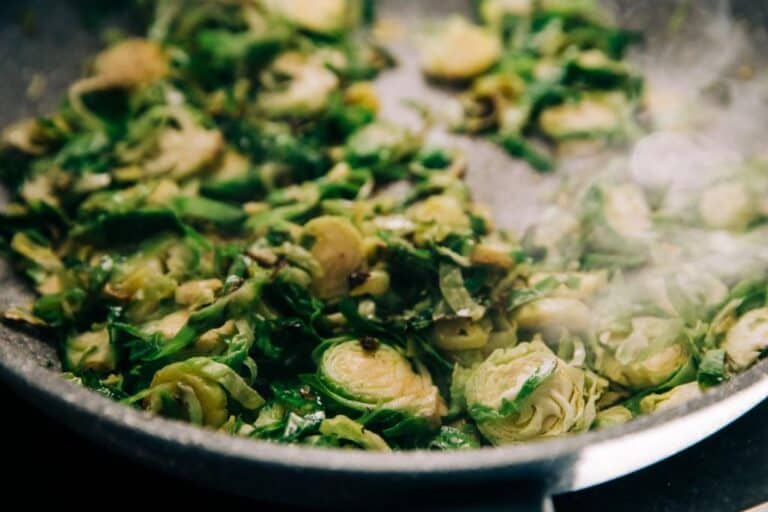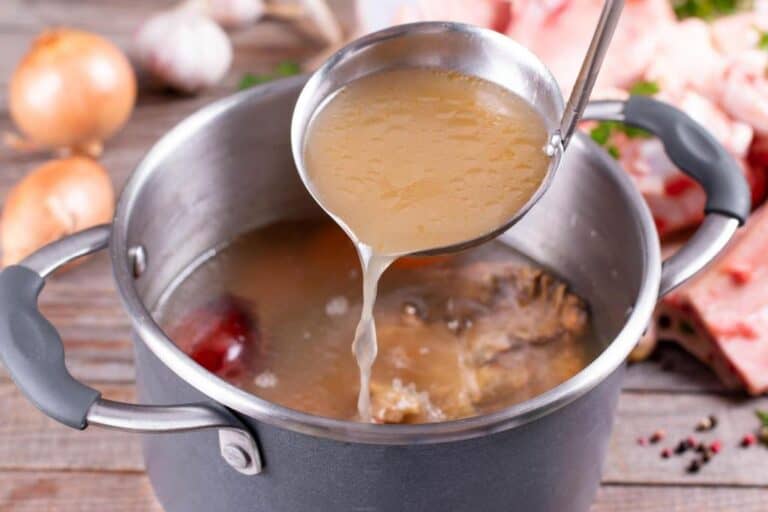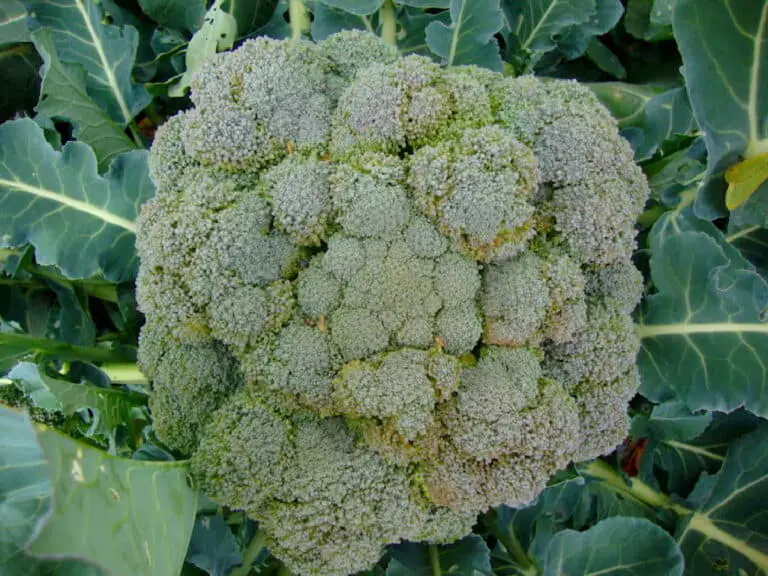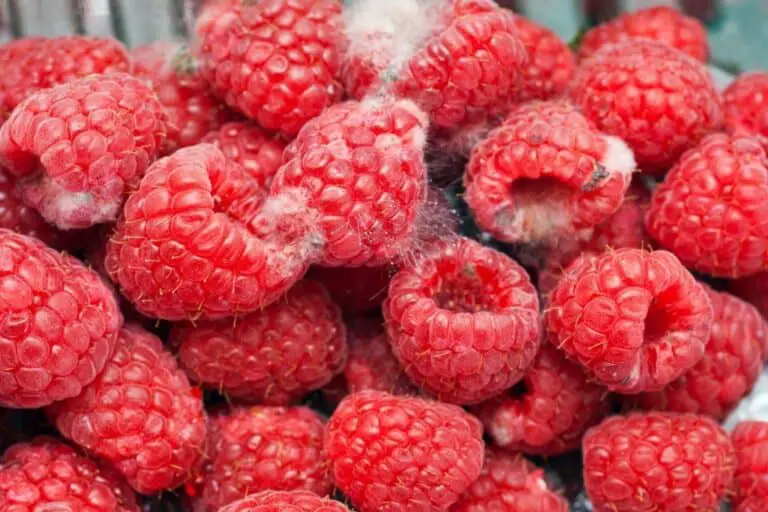Why Do Brussel Sprouts Smell So Bad? Here’s How to Reduce It
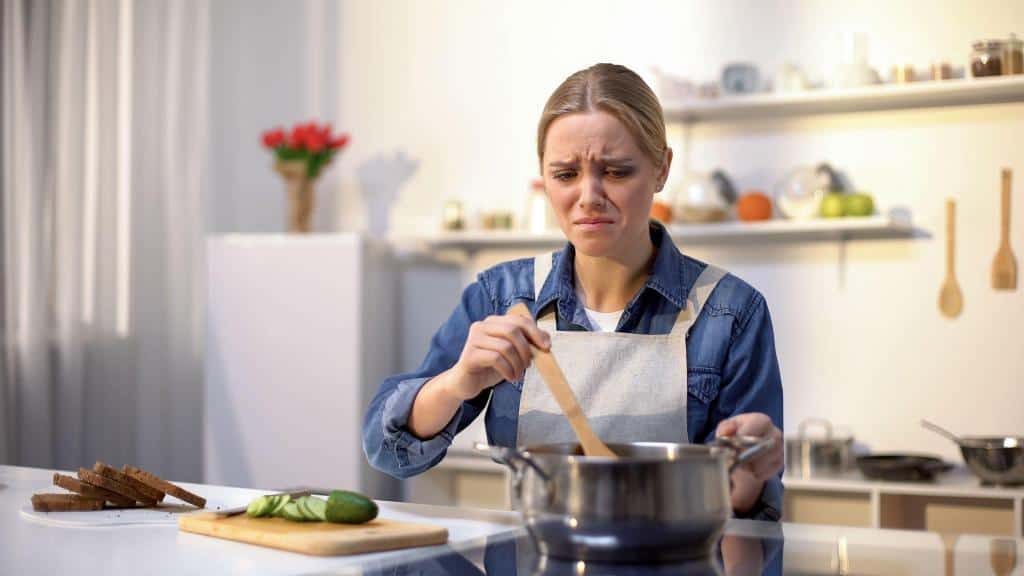
Brussels sprouts, those adorable mini cabbages, have long been a subject of both culinary curiosity and divided opinions. While some find their earthy flavor and slight bitterness delightful, others are quick to associate them with a pungent odor that can be off-putting.
So, why do Brussels sprouts smell so bad? And more importantly, is there a way to reduce it without sacrificing its delicious taste? In this article, we’ll dive into the fascinating science behind the smell of Brussels sprouts and explore practical tips to minimize its intensity.
Whether you’re a fan of Brussels sprouts or wish to convert skeptics, we’ll unveil strategies to reduce the strong smell while preserving their enticing flavors. From cooking techniques to flavor pairings and even some surprising secrets, we’ll equip you with the knowledge and tools to conquer the “bad smell” and unlock the true potential of these nutritious gems.
Get ready to embark on a culinary adventure that will make Brussels sprouts a staple in your kitchen without any aromatic reservations.
Why Do Brussels Sprouts Smell So Bad?
The distinctive smell of Brussels sprouts, often described as unpleasant or “bad” by some, can be attributed to the presence of certain compounds and chemical reactions that occur when these vegetables are cooked or prepared. While the smell may not be appealing to everyone, it is important to understand the science behind it.
It is worth noting that not everyone perceives the smell of Brussels sprouts as bad. Some individuals actually enjoy the earthy, pungent aroma, finding it appetizing and comforting. Additionally, the smell can vary depending on factors such as the freshness of the Brussels sprouts, cooking methods, and individual sensitivities.
The Culprit: Sulphur-Containing Compounds
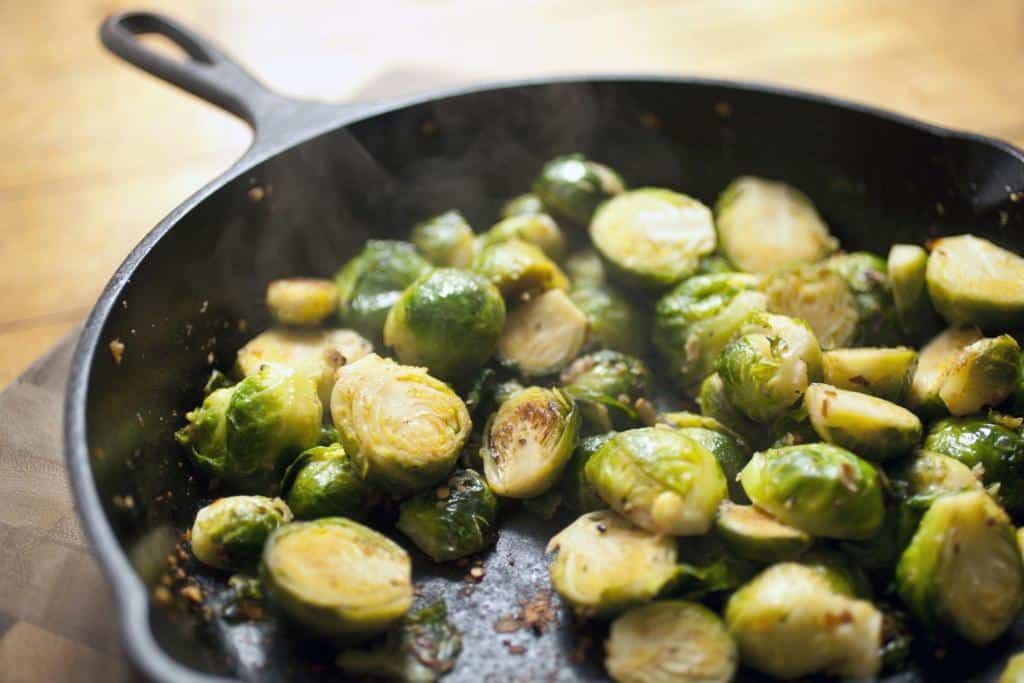
The unpleasant smell of Brussels sprouts can be attributed to the presence of sulfur-containing compounds. When Brussels sprouts are cooked or chopped, these compounds are released, giving rise to their characteristic odor. The most notable of these compounds is called glucosinolate, which is broken down into other sulfur compounds during cooking.
- Glucosinolate is a natural defense mechanism found in many cruciferous vegetables, including Brussels sprouts. It acts as a deterrent against pests and insects by releasing strong-smelling compounds when the plant is damaged. Although these compounds may be off-putting to humans, they serve an important purpose in protecting the plant in its natural environment.
- Hydrogen sulfide is a volatile sulfur compound that is released when Brussels sprouts are cooked or chopped. It has a pungent and rotten egg-like odor, which can contribute to the perceived unpleasant smell. While the scent of hydrogen sulfide can be off-putting to some individuals, others may find it intriguing or even appetizing.
- Isothiocyanates are another group of compounds found in Brussels sprouts that contribute to their smell. These compounds are formed when glucosinolates, another group of compounds, break down during cooking or preparation. Isothiocyanates have a distinct, strong aroma that adds to the overall smell of Brussels sprouts. The combination of hydrogen sulfide and isothiocyanates creates the characteristic odor that can be polarizing.
Table: Compounds Contributing to the Smell of Brussels Sprouts
| Compound | Contribution to Smell |
| Glucosinolates | Breakdown releases volatile sulfur compounds |
| Hydrogen sulfide | Contributes to the pungent odor |
| Isothiocyanates | Adds to the distinctive smell of Brussels sprouts |
How to Reduce the Smell of Brussels Sprouts
If you enjoy the taste of Brussels sprouts but find the smell overwhelming, there are several techniques you can try to minimize the odor during cooking. Here are some effective strategies:
1. Blanching
Blanching Brussels sprouts is a simple technique that involves briefly boiling Brussels sprouts in salted water before cooking them further. This method helps to reduce the strong smell by partially removing some of the sulfur compounds. To blanch Brussels sprouts, follow these steps:
- Fill a large pot with water and bring it to a boil.
- Add a generous amount of salt to the boiling water.
- Add the Brussels sprouts to the pot and cook them for about 2 minutes.
- Drain the Brussels sprouts and transfer them to a bowl of ice water to stop the cooking process.
- Once cooled, pat them dry with a paper towel and proceed with your chosen cooking method.
2. Roasting
Roasting Brussels sprouts in the oven is a popular cooking method that can help reduce the strong odor. The high heat caramelizes the natural sugars in the sprouts, creating a delicious nutty flavor while minimizing the smell. To roast Brussels sprouts, follow these steps:
- Preheat your oven to 425°F (220°C).
- Trim the ends of the Brussels sprouts and cut them in half.
- Toss the sprouts in olive oil, salt, and pepper.
- Spread them out in a single layer on a baking sheet.
- Roast in the preheated oven for about 20-25 minutes, or until they are tender and slightly browned.
3. Combining with Aromatics
Another effective way to mask the strong smell of Brussels sprouts is to combine them with aromatic ingredients. By adding herbs, spices, or flavorful ingredients, you can create a more pleasant aroma and enhance the overall taste. Here are a few ideas for aromatic pairings:
- Sauté the Brussels sprouts with garlic and onions.
- Sprinkle them with balsamic vinegar or lemon juice.
- Toss them with bacon or pancetta for a savory twist.
4. Steaming
Steaming Brussels sprouts is a gentle cooking method that helps retain their natural flavors while reducing the intensity of the smell. Here’s how you can steam Brussels sprouts:
- Fill a pot with about an inch of water and place a steamer basket or a colander on top.
- Trim the ends of the Brussels sprouts and cut them in half.
- Place the Brussels sprouts in the steamer basket or colander, ensuring they are in a single layer.
- Cover the pot with a lid and bring the water to a boil.
- Steam the Brussels sprouts for about 6-8 minutes,,or until they are tender when pierced with a fork.
- Remove the Brussels sprouts from the steamer and season them with salt, pepper, and any other desired herbs or spices.
5. Lemon Juice Rinse
An easy and quick way to reduce the odor of Brussels sprouts is to rinse them with lemon juice. The acidity of lemon juice helps neutralize the pungent smell and adds a refreshing citrus flavor. Follow these steps to perform a lemon juice rinse:
- Fill a bowl with cold water and add the juice of one lemon.
- Trim the ends of the Brussels sprouts and cut them in half.
- Place the Brussels sprouts in the lemon water mixture.
- Gently swish them around for a minute or two.
- Remove the Brussels sprouts from the water, drain, and proceed with your preferred cooking method.
6. Proper Ventilation
When cooking Brussels sprouts, it’s important to have proper ventilation in your kitchen to minimize the lingering smell. Open windows or turn on exhaust fans to allow the odor to dissipate. You can also place a bowl of vinegar or baking soda in the kitchen to absorb the smell.
7. Fresh Brussels Sprouts
Opting for fresh Brussels sprouts can make a noticeable difference in their odor. Fresh sprouts tend to have a milder smell compared to older ones. Look for firm, compact sprouts with vibrant green leaves and avoid any that appear discolored or have a strong, unpleasant odor.
Read: Can You Cook Brussels Sprouts Whole? Why It’s Worth Trying
Common Mistakes When Cooking Brussels Sprouts
To minimize the smell effectively, it’s essential to avoid common mistakes that can exacerbate it. Overcooking Brussels sprouts is a common pitfall that intensifies their odor. Prolonged cooking breaks down more glucosinolates, leading to a stronger smell. Therefore, it’s crucial to cook Brussels sprouts until they are tender but still retain their vibrant green color.
Furthermore, improper preparation methods can contribute to the unpleasant smell. Make sure to trim the stems and remove any damaged outer leaves before cooking. Washing the sprouts thoroughly under running water is also crucial to remove any dirt or debris that might affect their odor.
Lastly, inadequate seasoning can impact both the taste and smell of Brussels sprouts. To ensure a delicious outcome, be generous with your seasoning Brussels sprout choices. Incorporate spices, herbs, or other flavorings that complement the Brussels sprouts, enhancing their overall taste of Brussels sprouts while minimizing the smell.
How to Incorporate Brussels Sprouts into Different Recipes
Now that you’re equipped with ways to minimize the smell, let’s explore various delicious recipes that incorporate Brussels sprouts:
- Roasted Brussels Sprouts: Toss Brussels sprouts with olive oil, salt, and pepper, then spread them on a baking sheet. Roast in the oven at 425°F (220°C) for about 20-25 minutes, or until they turn golden brown and crispy on the edges. This simple method enhances the natural flavors of Brussels sprouts, resulting in a delightful side dish.
- Brussels Sprout Salad: Shave or thinly slice raw Brussels sprouts and combine them with ingredients like sliced apples, dried cranberries, toasted nuts, and a tangy vinaigrette dressing. The combination of textures and flavors creates a refreshing and nutritious salad.
- Stir-Fried Brussels Sprouts: Heat a wok or skillet with some sesame oil over high heat. Add sliced Brussels sprouts, minced garlic, and your choice of additional vegetables like bell peppers or snap peas. Stir-fry for a few minutes until the Brussels sprouts are tender-crisp. Season with soy sauce or other Asian-inspired sauces for a flavorful stir-fry.
- Brussels Sprouts and Quinoa Stuffed Peppers: Prepare a filling by sautéing Brussels sprouts, onions, garlic, and cooked quinoa together. Stuff the mixture into bell peppers and bake until the peppers are tender. This vegetarian dish is not only packed with nutrients but also showcases the versatility of Brussels sprouts.
- Brussels Sprout and Mushroom Risotto: Sauté sliced Brussels sprouts and mushrooms in a pan until they are golden and tender. Prepare a creamy risotto separately and fold in the sautéed Brussels sprouts and mushrooms at the end. The combination of earthy flavors creates a satisfying and comforting dish.
By incorporating Brussels sprouts into these diverse recipes, you can explore different flavors and textures while managing the odor.
Alternative Cooking Methods for Brussels Sprouts
If you’re looking to minimize the smell of Brussels sprouts while exploring different cooking styles, here are some alternative methods to consider:
- Grilling or barbecuing for a smoky flavor: Grilling Brussels sprouts adds a delightful smoky flavor while reducing the intensity of the smell. Simply toss them in olive oil, season with salt and pepper, and place them on a preheated grill or barbecue. Cook until they are tender with a slight char on the edges.
- Steaming to retain maximum nutritional value: Steaming Brussels sprouts is an excellent way to retain their nutritional value while minimizing the odor. Place the sprouts in a steamer basket over boiling water and steam until they are tender. This method ensures a delicate texture and a milder aroma.
- Sautéing or stir-frying with complementary ingredients: Sautéing or stir-frying Brussels sprouts with complementary ingredients can help balance the smell and enhance their flavor. Heat a pan with some olive oil or butter, add the sprouts along with ingredients like garlic, onions, or bacon for added depth of taste. Cook until they are lightly caramelized and enjoy the aromatic outcome.
Conclusion
While Brussels sprouts may have a notorious reputation for their strong smell, there are ways to reduce it and still enjoy their delicious taste and nutritional benefits. By blanching, roasting, steaming, combining with aromatic ingredients, performing a lemon juice rinse, ensuring proper ventilation, and choosing fresh sprouts, you can minimize the odor and make Brussels sprouts a delightful addition to your meals.
Experiment with different cooking methods and flavor combinations to find the ones that suit your palate the best. So don’t let the smell deter you, give Brussels sprouts a chance and discover their delectable side!
Whether you’re growing your own Brussels sprouts or trying to overcome an aversion, with the right techniques and an open mind, Brussels sprouts can become a delightful addition to your meals.
FAQs
Can you prevent Brussels sprouts from smelling when cooking?
While you can’t completely prevent the smell of Brussels sprouts when cooking, there are techniques that can minimize it. Try blanching Brussels sprouts briefly before cooking, or opt for roasting them in the oven to reduce the intensity of the smell.
How can I make Brussels sprouts taste better?
To make Brussels sprouts taste better, consider adding flavorful ingredients like balsamic vinegar, lemon juice, or bacon. You can also experiment with different cooking methods, such as roasting or sautéing, to enhance their natural flavors.
Are there any spices or ingredients that can help reduce the smell of Brussels sprouts?
Yes, certain spices and ingredients can help reduce the smell of Brussels sprouts. Adding herbs like rosemary or thyme, spices like cumin or paprika, or acidic ingredients like vinegar or lemon juice can help mask or balance the strong smell.
Are Brussels sprouts healthy despite their strong smell?
Absolutely! Despite their strong smell, Brussels sprouts are incredibly healthy. They are packed with vitamins, minerals, and dietary fiber. They also contain antioxidants and compounds that have been linked to numerous health benefits, including improved digestion, heart health, and cancer prevention.
Can the smell of Brussels sprouts be an indicator of their freshness?
Yes, the smell of Brussels sprouts can be an indicator of their freshness. Fresh Brussels sprouts should have a mild, earthy scent. If they have a strong, unpleasant odor, it may indicate that they are past their prime and not as fresh.
Can the smell of Brussels sprouts be eliminated entirely?
While it’s difficult to completely eliminate the smell of Brussels sprouts, following the tips and techniques mentioned can significantly reduce it. By blanching, roasting, or combining with aromatic ingredients, you can greatly mitigate the strong odor. However, keep in mind that the smell is a natural characteristic of Brussels sprouts, and some level of aroma may still remain.

